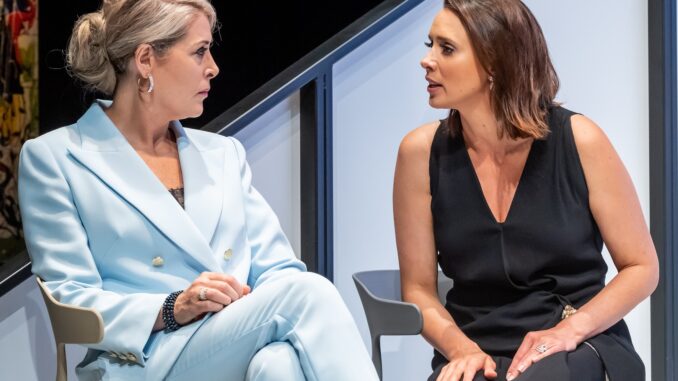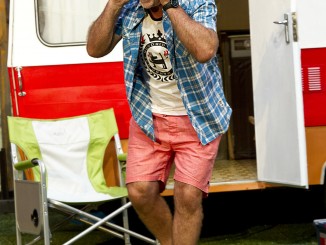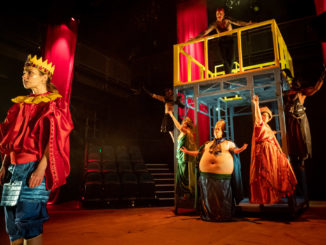
[Smartest in the Room]
It was Lady Bird Johnson who said a first lady is “an unpaid public servant elected by one person, her husband.” Nancy Harris’s 2019 play Two Ladies puts the women in the shadows centrestage. Deliberately not-so-fictional, its titular ladies Hélène (Jennifer Ward-Lealand) and Sophia (Anna Jullienne) are transparently based on Brigitte Macron and Melania Trump; they live in a timeline where the correct political response to terrorism is being hotly debated, and while the world may seem to be experiencing a turning point for gender relations, this is countered by backlash — whether it be through regressive government policies or male violence against women.
The play takes place after a terrorist attack not unlike 9/11 has devastated the United States. As two of the world’s most powerful men, Sophia and Hélène’s husbands are set to announce some very important decisions. When the global conference they are attending is derailed by protestors, everyone finds themselves in limbo, the wives especially. Everything unfolds in a single room, the world reeling out there with the women confined in here. As they trade barbs and share secrets, we witness a drama about two underestimated women. The production is well acted but could have done more to be really powerful and provocative.
The action (primarily located in the interaction between Hélène and Sophia, with the husbands unseen) begins when Sophia glides in wearing a blood-streaked designer dress, seemingly unperturbed. Press secretaries worry at her heels, played by Rena Owen and Adam Gardiner, who bring an entertaining energy cutting through the tenser moments between the antagonists. Sophia has had animal blood thrown at her by a disgruntled protestor because of her hot headed husband. Presumably, the terror attack has made him double down on his aggressive policies. While he stands poised to launch an invasion, Hélène’s pacifistic husband is more hesitant. “My husband is a different sort of figure,” she says evenly to Sophia.
Their discussion soon turns to what it takes to be a true leader, a subject on which Hélène is not short of ideas. The self-described smartest person in every room filled with men, she is the driving force in her husband’s politics. Yet at every international summit, she is not the one anyone really wants to talk to. When she left her own life in her 40s to start another with her husband, she recalls thinking about all she had abandoned and how she might compensate for it. “He can be great instead of me. He’s my legacy.”
As for Sophia, pregnant and clad in a figure-hugging dress, she knows she is there as a “trophy” to her husband’s success. When he stirs anger, she is the one who faces the consequences. He is responsible for the controversial policies, she says, but “I am the one at who they throw the blood.” Directed by old hand Colin McColl, Jennifer Ward-Lealand and Anna Jullienne embody their characters well. Ward-Lealand convincingly plays Hélène’s stubbornness and frustration, and Jullienne excels at Sophia’s vacant stare concealing a world-weary outlook. Possibly her most memorable moment comes when she makes a confession about her past and allows some vulnerability to slip through the mask. I won’t spoil what she discloses, except to say that, while compellingly performed by Jullienne, the content of her monologue was expected and seemed to play somewhat into stereotypes about Eastern Europe and its women.
This relative predictability is the script’s weakness: it largely treads familiar ground when it comes to women and power instead of offering truly fresh insights. The adherence to reality may be partly to blame. Like Brigitte, Hélène is considerably older than her husband, whom she met when she was his teacher. Like Melania, Sophia is a foreign ex-model. It might have been better to avoid explicit references to “the White House” or “Europe” in discussing their husbands’ houses of power. That way, the play could move beyond the immediately topical — and, ideally, escape becoming dated too quickly. While the plot’s outrageous developments (particularly near the end) cannot be called predictable, Two Ladies might have been more effective if it was more surprising in moments like Sophia’s confession and less shocking in creating conflict to raise the stakes.
In the end, we never get to see the women leave the room. For the duration of the play, they are flanked by large white screens. Perhaps Rachael Walker’s production design communicates something about how these women look out at the world and are looked at. Just as the audience, inside the room with Hélène and Sophia, can see shadows approaching the door without being able to make out who is coming, for the public outside, the first ladies are remote and inaccessible as if separated by an intangible screen. Their vocation is waiting, watching, and being watched.
Two Ladies plays at ASB Waterfront Theatre 9-27 February, 2021.




Leave a Reply